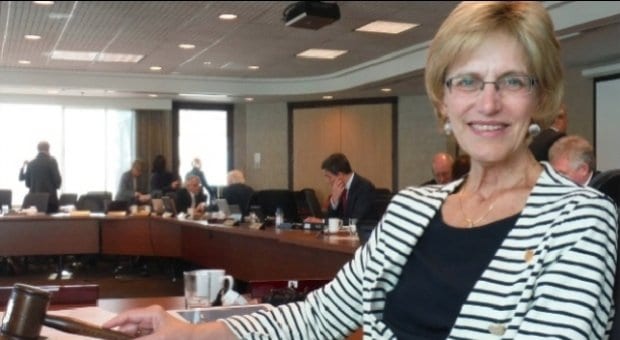Trinity Western University’s (TWU) proposed law school won’t be approved if a motion presented to British Columbia’s legal profession regulator passes April 11.
A notice of the motion was presented to Law Society of BC (LSBC) board members — or benchers — at the regulator’s monthly meeting Feb 28. LSBC first vice-president Ken Walker and second vice-president David Crossin will move the motion.
“Pursuant to Law Society Rule 2-27 (4.1), the Benchers declare that, notwithstanding the preliminary approval granted to Trinity Western University on Dec 16, 2013 by the Federation of Law Societies’ Canadian Common Law Program Approval Committee, the proposed Faculty of Law of Trinity Western University is not an approved faculty of law,” the proposed motion reads.
The notice of motion is not meant to be an opinion on the merits of the motion, the notice stresses.
TWU president Bob Kuhn, spokesperson for the TWU School of Law, told Xtra he’s disappointed with the notice of motion. He says the application has been turned into a public event.
“The public interest is being used as a stalking-horse popularity contest,” he adds. But, he says, he anticipates TWU will be able to respond to submissions made to the LSBC before the motion is made.
“We play the cards the way we’ve been dealt them,” he says. “We’re sort of stuck in a process we didn’t create. We did everything right. We played by the rules. The rules have changed.”
Kuhn says he hopes the LSBC procedure will be fair to TWU. “Beauty is in the eye of the beholder and so is fairness.”
To be admitted to TWU, students must sign a covenant agreeing to uphold Christian biblical teachings, including no premarital sex and no homosexuality. Failure to uphold these commitments, according to the student handbook, could result in discipline, dismissal or a refusal to readmit a student to the university.
Discussion of how to deal with the April 11 meeting, which will be attended by TWU representatives and will be webcast, dominated the Feb 28 meeting.
The society in January called for submissions on the application and, to date, says LSBC CEO Tim McGee, almost 170 have been received.
Submissions will be accepted until March 3, LSBC president Jan Lindsay says.
BC’s minister of advanced education, Amrik Virk, approved TWU’s application Dec 18, saying the province’s Degree Quality Assessment Board reviewed the proposed law degree and found it met the degree-program quality assessment criteria for private and out-of-province public institutions. The school was earlier green-lighted by the Federation of Law Societies of Canada, an umbrella group for territorial and provincial regulators of the legal profession.
The federation announced preliminary approval Dec 16, saying it had to examine only whether the proposed law school’s graduates would meet professional requirements for knowledge and competencies needed for entry to the bar admission programs in the Canadian common-law jurisdictions.
The LSBC has sought legal advice from outside lawyers, including former BC chief justice Lance Finch.
Lindsay cautioned benchers about debating an anticipated resolution until submissions are concluded. “Benchers should avoid making statements that could be taken by a reasonable observer as manifesting bias,” she says.
Benchers called for other information to be made available for review, such as US policies.
David Mossop called for items such as the BC Human Rights annual report, statistics on areas of discrimination and the equity ombudsman’s report on areas of discrimination. He also requested that law schools that have accepted TWU graduates be asked if those graduates have been involved in any “anti-gay activities.” Mossop also called for TWU to provide information on how many students have been disciplined for covenant violations.
“To what degree is it actually enforced?” he asked, noting it covers both same-sex and opposite-sex relationship behaviours. Mossop noted that TWU has student dormitories. “I find it hard to believe this doesn’t go on at these dormitories.”
Lindsay said Canadian law societies have indicated that they will be engaged in discussions and decisions about the law school at TWU.
On Feb 13, the Nova Scotia Barristers’ Society heard submissions from more than two dozen people on whether it should recognize law degrees from TWU and has posted submissions and a transcript of the proceedings on its website.
The Law Society of Upper Canada is expected to consider the TWU law school on April 11 and again on April 24. Both of those meetings will likely be webcast on the LSUC site.
Other law societies, such as Alberta and Saskatchewan, have stated they will go along with the federation’s decision.
As a result of the controversy around the application, the Canadian Bar Association passed a resolution Feb 23, urging the federation and the provincial and territorial law societies to require all legal education programs recognized by the law societies for admission to the legal profession to provide equal opportunity without discrimination on the basis of race, national or ethnic origin, colour, religion, sex, sexual orientation, gender expression, gender identity, age or mental or physical disability, or conduct that is integral to and inseparable from identity for all persons involved in legal education.
Toronto lawyer Clayton Ruby has said he’d be seeing the BC government in court after it approved the proposed TWU school. He says such a school would discriminate against prospective queer lawyers.
“It’s immoral and unconscionable and, we think, unconstitutional,” Ruby says. “We will be taking them to court.”
He said he would seek a court order striking down BC’s provincial approval. He says crafting that suit could take weeks or months.
Ruby says TWU’s law school would impose a “queer quota” on incoming law students. He estimates that there are approximately 1,600 places in law schools across Canada and that the 60 new places proposed by TWU would be off-limits to openly gay students.

 Why you can trust Xtra
Why you can trust Xtra


